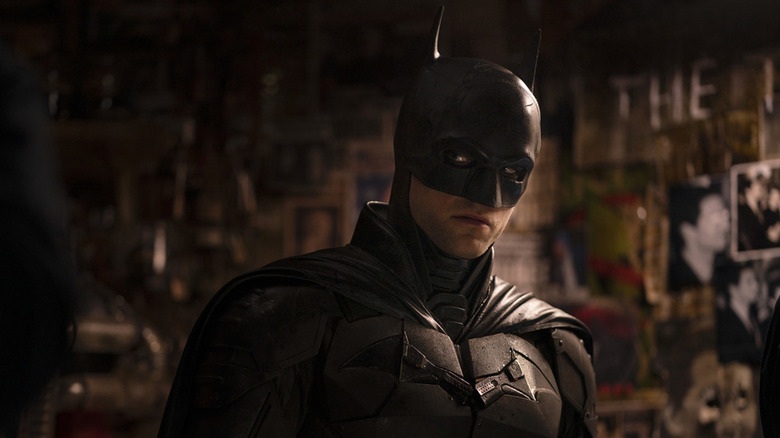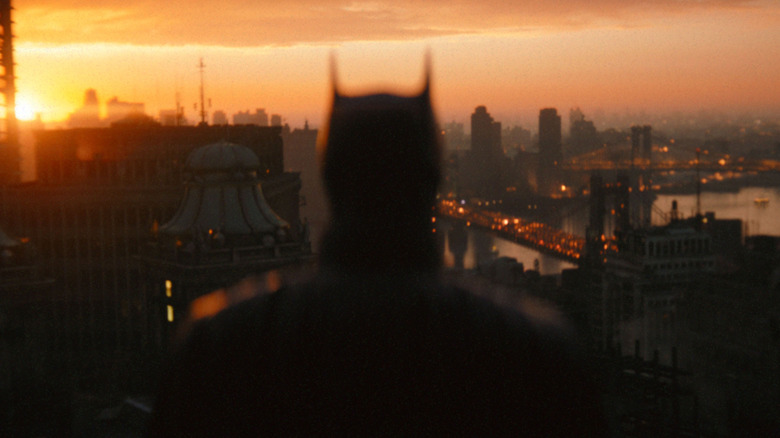The Batman Presents An Emerging Problem For The Box Office
One of the biggest, most-anticipated movies of the year is set to hit theaters this weekend in the form of "The Batman," the latest take on the iconic DC Comics superhero from director Matt Reeves. The film, which sees Robert Pattinson taking on the title role, has been in development for years and was one of the productions hit hardest by the pandemic. But it is finally debuting around the world over the next few days, with anticipation downright palpable. People are ready for more Batman.
As anyone might expect, the movie is expected to make a killing at the box office, with estimates ranging anywhere from $80 million on the low-end to $160 million on the high-end. Odds are, it will get closer to the high-end. That's a great thing for movie theaters, and it may inspire confidence in moviegoers, but the movie is also shining a big, bright Bat-signal on an emerging issue at the box office: Virtually nothing by way of competition will be released against "The Batman" for most of March, meaning it will be just about the only game in town. This is going to be good for Warner Bros. and those who wish to see a sequel to this movie, but if the trend continues, it is a bad sign for the industry as a whole.
The Batman stands alone
It's not exactly surprising that studios are a little hesitant to release any other box office bets against "The Batman," but a little bit of counter-programming to a gigantic blockbuster used to be a good and necessary thing. Yet, in this case, Guy Ritchie's "Operation Fortune: Ruse de Guerre" was delayed by STX to avoid Battinson, while "The Contractor" was sold to Showtime, taking some potential competitors off the board. It certainly didn't help matters that both "Studio 666" and "Cyrano" bombed this past weekend, as the only new releases making their way out into the world just ahead of "The Batman." Plus, Disney decided to move Pixar's "Turning Red" to Disney+, taking another possible hit off the board entirely.
So what stands in the way between the Caped Crusader and total dominance for nearly the entire month of March? Virtually nothing, save for the real-life drama "Tyson's Run" and director Ti West's horror movie "X." The first bit of major competition that will be coming down the pipeline doesn't arrive until March 25, in the form of Channing Tatum and Sandra Bullock's "The Lost City. That gives DC's latest a full three weeks virtually unabated. This is not a sustainable model for movie theaters going forward, nor is it really to the benefit of studios to allow this pattern to continue. Something has to give.
Superheroes can't fight the good fight without help
2021 was a wildly uneven year in terms of recovery at the box office, but the one thing that worked unquestionably was superhero stuff (big surprise!). In particular, "Spider-Man: No Way Home" obliterated any and all expectations by taking in more than $1.8 billion to date. No other American movie has even come close to touching $1 billion since the pandemic started, let alone approaching $2 billion. In terms of global awareness, Batman is right up there with Spider-Man, so it's easy to see why "The Batman" has been given such a big runway.
But herein lies the problem: Superheroes can't be the only thing propping up the box office at all times. Sure, it looks good when the number one movie at the box office makes $100 million or more, but what about the other films in the top 10? Theaters depend on those movies to bring people out as well. Without reasonable counter-programming, the system as it exists — especially as theaters are truly attempting to recover from a brutal couple of years — will not be able to sustain itself. This is almost definitely why Cinemark is experimenting with variable ticket pricing, as to cash in bigger on these desirable blockbusters. But it can't be "big-name franchises in theaters and everything else streaming." That just flat out isn't going to work in the long run.
I understand a lot of this comes down to the consumer. Part of the problem is hesitation on the part of moviegoers and the majority of them being far more deliberate about what coaxes them into theaters. The other part of it comes down to ease of access for so much other entertainment. Going to the movies isn't currently considered the standard weekend hobby for people like it used to be when they have countless streaming options at home. But diverting any and all other forms of entertainment away from gigantic blockbusters is only going to keep those people away from theaters when one of those movies isn't playing. It doesn't help build back consumer habits or consumer confidence.
What's to be done?
Much of what I am about to say is very easy to say in my position. I am not the head of a major studio. I am not a man who has millions of dollars invested in a movie that requires lots of people to see it to make that money back. I am merely a man who loves the movies and values the theatrical experience. Having said that, I think the long-term viability of the theatrical marketplace is going to depend on studios not backing away from every major blockbuster and committing to counter-programming. Period.
Just look at the way things used to be. "Star Wars: The Force Awakens" shattered records upon its debut and yet, the comedy "Sisters" with Tina Fey and Amy Poehler was able to open against it, debuting to $13 million against a $30 million budget and ultimately finishing with $105 million worldwide. That is counter-programming at its finest. I understand that the pandemic changed things irrevocably, but that doesn't mean that streaming has accounted for the lost revenue from ticket sales (at least not yet), and a big part of that is going to come down to more than one or two movies making a decent chunk of change on a given weekend. Letting "The Batman" run wild isn't the answer.
What happens when "Doctor Strange in the Multiverse of Madness" or "Jurassic World Dominion" hit theaters? Are more movies going to be delayed out of fear? Are the summer months going to be filled with blockbusters and only blockbusters one week after the next with no room for anything else? This does not seem like a world that is welcoming to all types of moviegoers, nor is it one that can sustain big movie studios forever. Blockbusters are a big part of the box office pie but they're not everything.
Just look at "Dog" opening against "Uncharted" recently, which managed make its entire $15 million budget back in a single weekend. That, to me, is the type of future we can and should be looking forward to. Yes, I understand giving a gigantic movie a week or so to do its thing, but it can't take up a full month of the year. This is not the way to emerge from the pandemic. This is a short-sighted path that will damage the future more than it will help the present. Studios must hedge their bets on the future, even if it means taking some risks right now.



